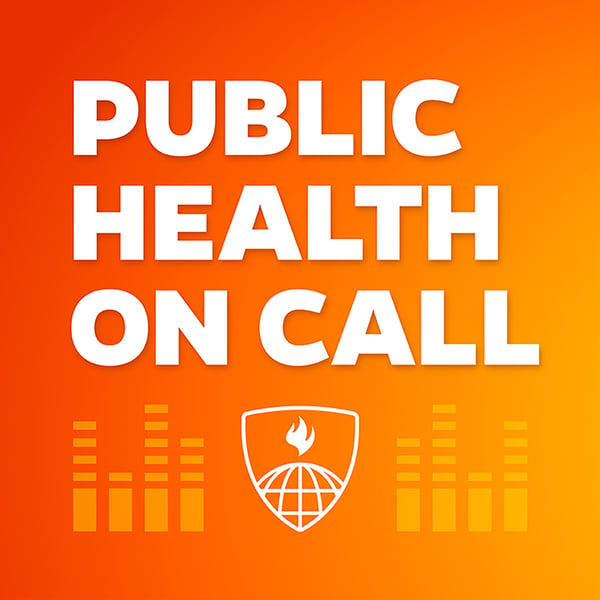918 - Should AI Be Your Therapist?
Public Health On Call
The Johns Hopkins Bloomberg School of Public Health
4.8 • 620 Ratings
🗓️ 14 July 2025
⏱️ 15 minutes
🧾️ Download transcript
Summary
About this episode:
Artificial intelligence is changing everything about how we work, live, and study—and, now, AI therapy chatbots are poised to transform mental health care. In this episode: Stanford researcher Nick Haber details recent data that suggests that therapeutic AI has a long way to go in addressing biases and recognizing safety-critical situations in order to provide adequate care.
Guest:
Nick Haber, PhD, is an assistant professor at the Stanford Graduate School of Education, and by courtesy, Computer Science, where he researches AI implementation for learning and therapeutic tools.
Host:
Stephanie Desmon, MA, is a former journalist, author, and the director of public relations and communications for the Johns Hopkins Center for Communication Programs, the largest center at the Johns Hopkins Bloomberg School of Public Health.
Show links and related content:
- Expressing stigma and inappropriate responses prevents LLMs from safely replacing mental health providers—FAccT '25: The 2025 ACM Conference on Fairness, Accountability, and Transparency
-
Kids Are in Crisis. Could Chatbot Therapy Help?—New York Times
-
Exploring the Dangers of AI in Mental Health Care—Stanford Institute for Human-Centered AI
Transcript information:
Looking for episode transcripts? Open our podcast on the Apple Podcasts app (desktop or mobile) or the Spotify mobile app to access an auto-generated transcript of any episode. Closed captioning is also available for every episode on our YouTube channel.
Contact us:
Have a question about something you heard? Looking for a transcript? Want to suggest a topic or guest? Contact us via email or visit our website.
Follow us:
-
Here's our RSS feed
Note: These podcasts are a conversation between the participants, and do not represent the position of Johns Hopkins University.
Transcript
Click on a timestamp to play from that location
| 0:00.0 | Welcome to Public Health On Call, a podcast from the Johns Hopkins Bloomberg School of Public Health, |
| 0:05.9 | where we bring evidence, experience, and perspective to make sense of today's leading health challenges. |
| 0:16.3 | If you have questions or ideas for us, please send an email to public health question at jh.h.u. |
| 0:22.6 | That's public health question at jh.u.edu for future podcast episodes. |
| 0:30.6 | Hey, listeners, it's Lindsay Smith Rogers. Given the well-documented shortage of mental health providers, should AI replace your human therapist? |
| 0:39.7 | Today, Dr. Nick Haber of Stanford University joined Stephanie Desmond to talk about his recent research, |
| 0:45.4 | which suggests that the answer for now is no. They discuss how chatbots used for therapy have some serious |
| 0:52.2 | drawbacks, such as giving dangerous answers to questions |
| 0:55.1 | from someone in a mental health crisis. |
| 0:57.5 | But he notes, as with most AI development, things could change rapidly. |
| 1:02.7 | Let's listen. |
| 1:03.8 | Nick Haber, welcome to public health on call. |
| 1:06.2 | Thank you. |
| 1:06.6 | Yeah. |
| 1:06.8 | So great to be here. |
| 1:07.8 | So I've invited you here today to answer this question, which you have been researching. |
| 1:13.7 | Should AI replace your therapist? |
| 1:16.7 | And before we get into that, I was hoping you could tell a little bit about why you decided to do this research and what you learned. |
| 1:25.5 | So, you know, I think I should maybe start up by saying I am by no means a therapy expert, |
| 1:30.4 | right? |
| 1:30.7 | I work on AI, work on understanding AI, work on making better AI, work on applying AI. |
| 1:37.1 | This project, I and others have all heard about, right? |
... |
Please login to see the full transcript.
Disclaimer: The podcast and artwork embedded on this page are from The Johns Hopkins Bloomberg School of Public Health, and are the property of its owner and not affiliated with or endorsed by Tapesearch.
Generated transcripts are the property of The Johns Hopkins Bloomberg School of Public Health and are distributed freely under the Fair Use doctrine. Transcripts generated by Tapesearch are not guaranteed to be accurate.
Copyright © Tapesearch 2025.

